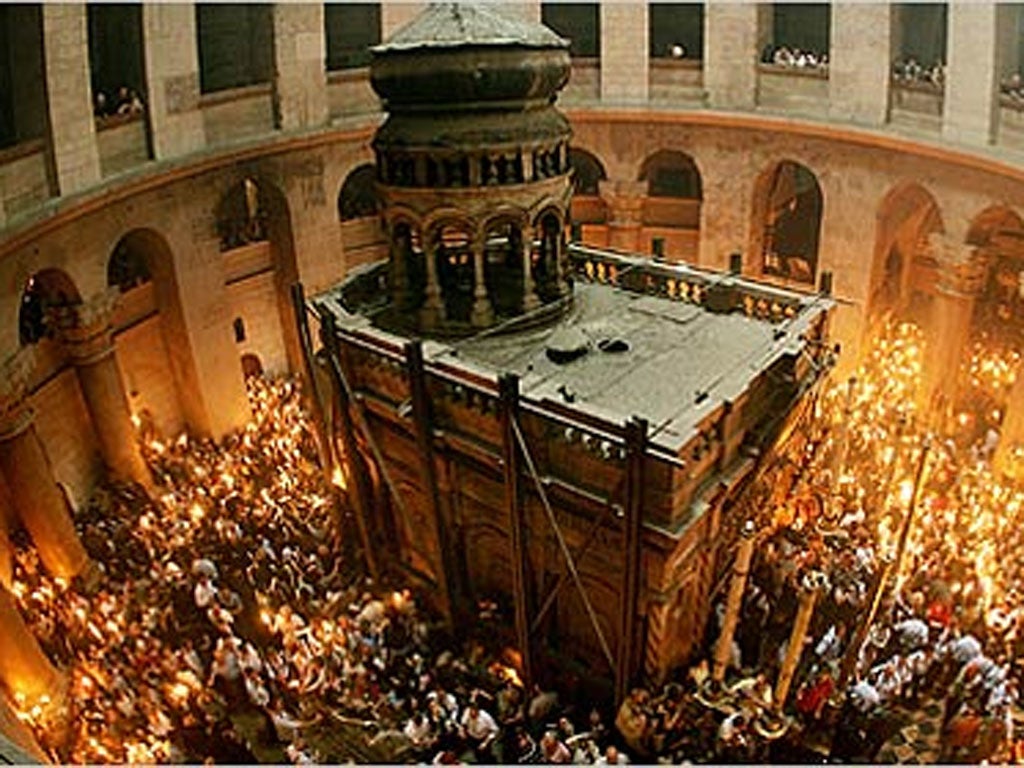Unholy row erupts over Church of the Holy Sepulchre's water bill
Priests at holy site are shocked by supplier’s demand for arrears and interest of £1.5m

Your support helps us to tell the story
From reproductive rights to climate change to Big Tech, The Independent is on the ground when the story is developing. Whether it's investigating the financials of Elon Musk's pro-Trump PAC or producing our latest documentary, 'The A Word', which shines a light on the American women fighting for reproductive rights, we know how important it is to parse out the facts from the messaging.
At such a critical moment in US history, we need reporters on the ground. Your donation allows us to keep sending journalists to speak to both sides of the story.
The Independent is trusted by Americans across the entire political spectrum. And unlike many other quality news outlets, we choose not to lock Americans out of our reporting and analysis with paywalls. We believe quality journalism should be available to everyone, paid for by those who can afford it.
Your support makes all the difference.Priests at the Church of the Holy Sepulchre in Jerusalem, which is held to be the site of the Crucifixion and the empty tomb of Jesus Christ, are threatening to close one of Christendom's holiest sites after a water company froze the bank account of the Greek Orthodox Patriarchate over millions of pounds in unpaid water bills.
Traditionally, holy places in Jerusalem have been exempt from local taxes and other charges – a policy that was confirmed in 1969 after Israel annexed the Old City.
The status of Christian sites and the sensitive division of their ownership and management between sometimes rival denominations is enshrined in an ancient agreement known as the Status Quo.
Nowhere is the inter-church pact more sensitive than at the Church of the Holy Sepulchre, a labyrinthine basilica dating back to the 4th century and mostly owned and managed by the Greek Orthodox church, together with the Franciscan Custody of the Holy Land and the Armenian Patriarchate, with smaller niches reserved for Coptic, Syrian, Ethiopian and other churches.
Under the Status Quo, Christian shrines have been allowed to operate with near-autonomy over the years by the successive Ottoman, British mandate, Jordanian and Israeli governments.
In 1967, when Israel captured the Old City, it continued that pragmatic tradition. Then in 1996 came the privatisation of Jerusalem’s water supply and its transfer from the Israeli municipality to Hagihon Inc.
In 2004, Hagihon sent the church a bill for 3.7 million shekels – the equivalent of nearly £500,000 at the time. The church, thinking it was a mistake, ignored it. Earlier this year, Hagihon returned with a revised demand for nine million shekels – about £1.5m – that included water supplies for the past seven years, plus interest on the unpaid debt.
The two sides began negotiations, assisted by intermediaries from various Israeli government departments and advisers to the Mayor of Jerusalem, Nir Barkat.
Archbishop Aristarchos of Constantina, the general-secretary of the Greek Orthodox Patriarchate, the largest church in the Holy Land, told The Independent that the two sides had seemed to be nearing agreement when Hagihon suddenly enforced a court order last week to freeze the patriarchate’s central bank account. “We were in the middle of negotiations and we committed to start to pay from now on,” the archbishop said. “We said we were willing to pay but it was very difficult for us to meet previous debts for which there was no agreement. We asked that the nine million shekels of old debts be deleted.
“But despite the fact that we were in negotiations, Hagihon applied to freeze the account of the Greek Orthodox Patriarchate. This was an arbitrary measure since we were negotiating. They should have waited to come to an agreement.”
He said that unless the account was unfrozen, the church would have to consider a “non-confrontational response” that could include closing the church. “We would like to help find a solution. We are not entirely negative. Thousands of pilgrims visit the Church of the Holy Sepulchre every day, and most of the water is used for them,” he said.
Israeli officials were unavailable for comment tonight.
Join our commenting forum
Join thought-provoking conversations, follow other Independent readers and see their replies
Comments